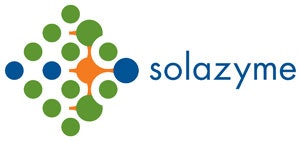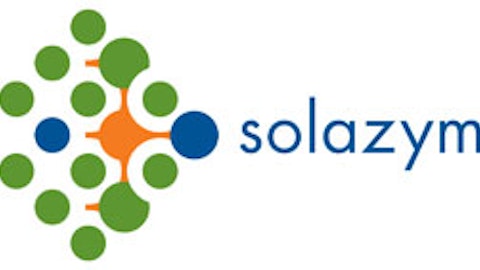Alternative oils play Solazyme Inc (NASDAQ:SZYM) may have just gotten riskier; apparently, many investors think so. Unlike many stocks today, Solazyme Inc (NASDAQ:SZYM)’s trip to the woodshed is hinged on actual news and, unfortunately, it’s one of the market’s biggest decliners as of this writing. Today we learned that one of its partnerships will be dissolved within weeks.
Solazyme and France’s Roquette Freres will no longer work together on creating food additives. Solazyme cited “divergent views on an acceptable commercial strategy and timeline for the manufacturing and marketing of joint venture products” as the cause.
Solazyme Inc (NASDAQ:SZYM) is more than a biofuels play like fellow biofuels upstarts like Amyris Inc (NASDAQ:AMRS) and Gevo, Inc. (NASDAQ:GEVO). I purchased shares of Solazyme for the Prosocial Portfolio (I hold shares in my personal portfolio, too) not only for its impressive foray into a nascent field, but also because it had already inked some impressive partnerships. Meanwhile, its alternative oils go much further than simply trying to provide alternatives to fossil fuels. Its microalgae-derived oils can also be used in skin care and food.
The Roquette Freres deal was a clear example of that differentiation. Under the agreement, Roquette would shell out the capital for manufacturing facilities and Solazyme would have provided its cutting-edge technology. The resulting oils were supposed to increase foods’ nutritional content.
Furthermore, Roquette isn’t Solazyme Inc (NASDAQ:SZYM)’s only big partner for the nutritional additives market. It also has active partnerships or joint ventures with Unilever plc (ADR) (NYSE:UL), Bunge Ltd (NYSE:BG), and Archer Daniels Midland Company (NYSE:ADM).
Maybe investors shoudn’t freak out too badly, though. The potential for situations like this one is outlined in the company’s Form 10-K, so speed bumps aren’t particularly surprising. Solazyme’s risk factors clearly state the potential challenges due to its dependence on its partners.
Among the previously disclosed risks: Solazyme Inc (NASDAQ:SZYM)’s lack of control over how quickly its partners can move on commercialization. For example: “Further, we may have limited control over the amount or timing of resources that any partner is able or willing to devote to production and processing of our products.” That seems to echo this very situation. In addition, Solazyme Inc (NASDAQ:SZYM) got specific, stating that its relationship with Roquette might not be successful, so a dissolution wasn’t out of the question.
This isn’t exactly comforting news — there’s a lot of “wait and see” here — but I’m not a proponent of the kind of panic selling going on today. Granted, a nearly 20% fall feels dreadful, but we shouldn’t rule out that the partnership’s dissolution may actually end up being better for the long term, not worse. Solazyme said that the failed partnership will not affect this year’s revenue; if it can accelerate ramping up its business, then it could be a strategic positive for its shareholders.
Meanwhile, compare Solazyme Inc (NASDAQ:SZYM) to some of the other biofuels companies. Amyris Inc (NASDAQ:AMRS) is currently in legal hot water due to its consistent inability to get its fuel production up and running at all. News of lawsuits has overshadowed any sign of good news.
Several days ago, another rival, Gevo, Inc. (NASDAQ:GEVO), which enjoys the backing of France’s Total, finally restarted its isobutanol plant that it shut down in September due to contamination issues. The shutdown had resulted in a scary 92% decrease in revenue in the third quarter, and while Gevo, Inc. (NASDAQ:GEVO)’s now getting back into the game, it’s obviously lost traction and time, and the plant isn’t even back to full production capacity yet.
Solazyme isn’t for those averse to risk, but it’s still ahead of the game as many other similar companies have struggled to get their technologies into the commercial phase. Let’s acknowledge Solazyme’s risks, but shut down the temptation to panic with all the others. Personally, I’m holding on and watching with interest.
The article Did Solazyme Just Get Riskier? originally appeared on Fool.com and is written by Alyce Lomax.
Alyce Lomax owns shares of Solazyme. The Motley Fool recommends Unilever. The Motley Fool owns shares of Solazyme.
Copyright © 1995 – 2013 The Motley Fool, LLC. All rights reserved. The Motley Fool has a disclosure policy.






